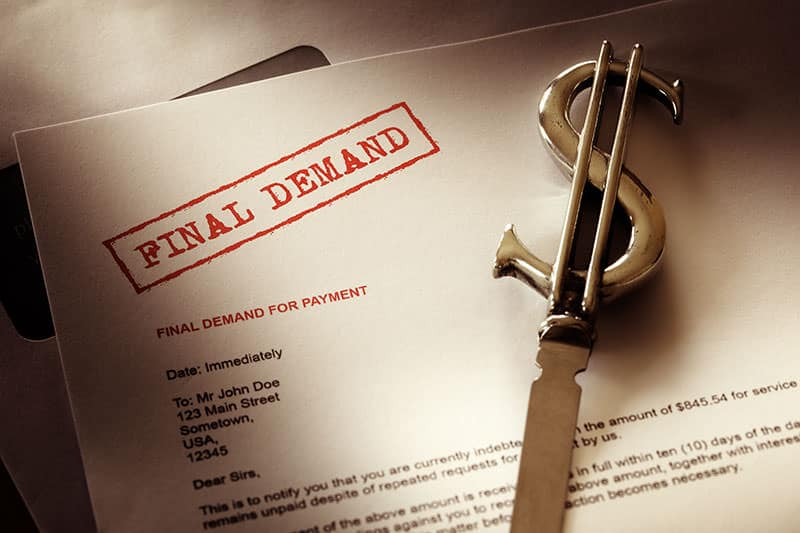A demand letter is a document that personal injury attorneys send to a defendant’s insurance company (or the defendant if the defendant does not have insurance) that puts the insurance company on notice that the plaintiff has a legal claim against the defendant.
Why Do Personal Injury Attorneys use Demand Letters?
Personal injury attorneys use the demand letter as a way to initiate settlement negotiation. You should always be prepared to go to court in your personal injury case. However, it is important to remember that the majority of cases in the United States settle outside of court. Alternative dispute resolution, such as mediation, has grown in popularity across the nation because these forms of dispute resolution save time and money for the parties involved in the lawsuit. Knowledgeable attorneys use demand letters to spark settlement negotiations.
In this sense, the demand letter is a negotiation tactic. Insurance companies often have their bottom line in mind when they are making settlement offers. Thus, it is important to let the insurance know that the plaintiff is serious about pursing their personal injury case. If the insurance company knows that the plaintiff is serious about their case the insurance company may start to offer reasonable settlement offers to the plaintiff.
What do I need to know About Demand Letters?
You do not have to worry about drafting a demand letter to the insurance company because your lawyer will complete this task. However, it is important to know what a demand letter is and why the demand letter is used.
Specifically, it is important for plaintiffs to know how to use demand letters to prevent insurance companies from taking advantage of the situation.
What is Normally Included in Demand Letters?
The Facts
The first thing that is included in a demand letter is the facts that led up to the dispute. It is important to remember that the insurance company probably views the facts of the case in a different way than the plaintiff does. Your attorney will use the demand letter as a way to inform the insurance company about the evidence that supports your version of the events that led up to your claim.
The facts must be laid out in a way that places emphasis on the defendant’s liability and decreases the other side’s opportunity to argue that the plaintiff was comparatively negligent.
The Demand v. The Costs
Your letter should clearly indicate the amount of money that you believe would fairly settle your case. This money is the “demand†that you are making in your letter.
The demand for compensation should be weighed against the costs of failing to accept the demand. As discussed in the previous part of this article, insurance companies have their bottom line in mind when they are making settlement offers.
Your demand letter should include a statement about the benefit the insurance company would have if they settled your case. The letter should indicate that the settlement would be beneficial to the insurance company.
The demand letter should explain that failure to settle the case before trial would result in a greater cost to the company. For this reason, the letter should include a statement about court costs, lawyers’ fees and other expenses that the insurance company should consider when they are deciding whether they will settle your case.   For more information about the “cost†of not settling, see our article on “What is a Stower’s Demand.â€
The Law
One of the most important components of the demand letter is a statement about how the law supports your position. Your letter should indicate the causes of action that you can bring against the insurance company. Typically, in a personal injury action, the cause of action is negligence.
Up until this point, you have been thinking that it would be possible to skip hiring a personal injury attorney and complete the demand letter yourself. But, before this section of the demand letter is written and sent to the other side, it is important that you discuss your case with an experienced personal injury attorney.
Experienced personal injury attorneys have years of experience dealing with complex personal injury litigation. Your attorney will know the law, and will know how to apply the law to your situation. This knowledge can prove to be an invaluable advantage in your personal injury case.
The Opportunity to Settle
Your letter should indicate that the insurance company has a chance to settle your case for a reasonable amount. Insurance companies are often looking to settle cases in a way that saves the company money. If you present your case as an opportunity to settle for less money than it would cost the company to go to court you will greatly increase the insurance companies desire to settle your case.
You should also provide a deadline for the insurance company to make an offer. In order to trigger Stowers liability, you should give the insurance company at least 16 days from the date of receipt of the letter. To confirm when the insurance company receives the letter, send it certified mail, return receipt requested.
The Supporting Documentation
Your demand letter should also include supporting documentation. This will give backing to the amount of compensation that you want to receive. If you do not include documentation in your demand letter, the insurance company will likely not believe that you are entitled to as much compensation as your letter indicates.
There are many different types of documentation that you can include in your demand letter. This includes:
- Medical records
- Prescriptions
- Bills (including bills for your medical treatment and bills for your property damage)
- Photographs of the accident
- Photographs of your injuries
- Letters from work that indicate that the plaintiff had to miss work
- Reports by experts that indicate the extent of your injury
The key to sending this documentation is to remember that you want to send enough information for the insurance company to know that they need to take your case seriously. If you send an organized, detailed demand letter, the insurance company will be more likely to offer you a fair settlement.
Also, it is imperative that you keep a record and proof of what you send to the insurance company.
What should I do if I have Questions about Demand Letters?
Personal injury cases can often be very complex. If you have questions about any part of your personal injury case, including demand letters, you should contact the lawyers at Stoy Law Group PLLC. Our experienced personal injury attorneys would be happy to offer you a free case consultation.














